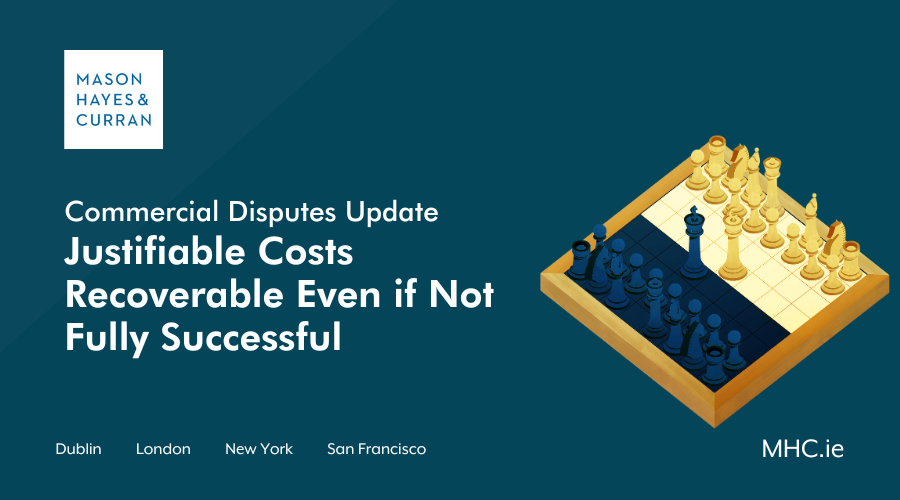Justifiable Costs Recoverable Even if Not Fully Successful

The Court of Appeal has recently addressed the recoverability of costs regarding an issue on which the appellant did not succeed. However, the court felt the appellant had been justified in arguing this issue, especially at first instance. The decision confirms that, in appropriate cases, the ‘big picture’ should be considered when determining cost awards. This approach avoids focusing on the outcome of specific issues. Our Commercial Disputes team examines this decision.
The Court of Appeal recently dealt with a case involving the determination of costs. In the High Court and in the Court of Appeal, the appellant in question had raised two arguments[1]. In the High Court, he had not succeeded on either but, in the Court of Appeal, he prevailed. The Court of Appeal decided the appeal in his favour based on one of the grounds and therefore did not determine the other. The respondent accepted that the appellant should be entitled to the costs of the appeal from the respondent on the usual basis. However, a dispute arose regarding the High Court costs order which had to be revisited in light of the successful appeal. In ultimately awarding the respondent all of his costs in the High Court as well, the Court of Appeal cautioned that the focus on costs should be on the “big picture”. Here, it was felt that the appellant was justified in raising both grounds and that he should also be entitled to his High Court costs.
Background
The case related to an application made to refuse recognition of a judgment handed down in Poland. Two public policy grounds were advanced in support of that application in reliance on Article 45.1(a) of the Brussels Recast Regulation (Reg (EU) 1215/2012):
- The judgment had been issued by a Polish Court which was improperly constituted contrary to principles of judicial independence. This was called the ‘rule of law’ issue.
- Whether the transfer of the underlying causes of action to the respondent were such as Irish law would treat as being contrary to the prohibition on maintenance and champerty[2]. This was called the ‘assignment’ issue.
The High Court had rejected the refusal application and the respondent raised the same two arguments on appeal. However, on appeal, he was successful. The Court of Appeal granted the appeal on the second ground – the ‘assignment’ issue. In light of that finding, the judgment expressly did not deal with the first ground. The question of costs, not only of the appeal but in the High Court, therefore had to be addressed by the Court of Appeal.
The positions on costs
The substantive appeal judgment indicated that since “the appellant has been entirely successful in this appeal, it would appear the appellant is entitled to the costs of the appeal.” The subsequent costs ruling noted that the respondent had accepted that the appellant was entitled to his costs of the appeal. This was despite the fact that a considerable portion of the Court of Appeal hearing was taken up with submissions on the first, ‘rule of law’, issue.
However, the parties adopted different positions on the award of the High Court costs. As a result, the Court of Appeal had to revisit that given that the appeal had succeeded. The appellant maintained that, he had been ‘entirely successful’ in the proceedings, being the relevant test under Section 169(1) of the Legal Services Regulation Act 2015. Accordingly, he said he was entitled to his costs under that Act - as well as Order 99 of the Rules of the Superior Courts and relevant case law.[3] He asserted that there was no reason why he should not be entitled to his full costs and it was reasonable to have raised both grounds. By contrast, the respondent claimed that if the appellant had confined his arguments in the High Court to the ‘assignment’ issue, it would have finished within one day. In addition, not only did the raising of the ‘rule of law’ issue lengthen the High Court hearing, it required expert evidence to be given. This, as a result it was claimed, also increased costs. The respondent therefore argued that costs should be apportioned where additional issues raised did not succeed. That argument is consistent with the position adopted in the seminal decision of Veolia Water[4]. The appellant was, it was claimed, wrong to have raised the ’rule of law’ issue. On that basis, it was said that the parties should either bear their own High Court costs or the appellant should be awarded only half his High Court costs.
The judgment
In considering the treatment of the costs in the High Court, the Court of Appeal reviewed the High Court judgment. It noted that the trial judge had specifically not dealt with the ‘rule of law’ issue. This was because the appellant had requested that she refer the specific legal issue to the CJEU for a ruling. However, a CJEU reference should not be made where the case can be dealt with on other grounds. Accordingly, the trial judge therefore felt it was not necessary to give the court’s view on that ground and formally decided the case on the other, ‘assignment’, issue.
The Court of Appeal was satisfied that it was not the case that a party was ‘wrong’ to raise a ground simply because the court has found against them overall. It also did not accept that “a party’s conduct of litigation was unreasonable by the mere fact alone that they raised a point which the court held against them but that the appellate court did not find necessary, for specific reason, to address in its decision.” It went on to note that, even where a party has not been ‘entirely successful’, the court can still have regard to the factors at Section 169(1)(a)-(g) of the Legal Services Regulation Act 2015 when determining costs. Ultimately, the Court of Appeal felt the raising of the ‘rule of law’ issue was “reasonable in the circumstances” and noted that “the focus of the trial judge on costs ought to be the big picture rather than a nitpicking of every single item or minute spent by each party in the course of litigation”[5]. This effectively meant that the apportionment of costs by reference to specific issues depending on who had succeeded on them, as set down in Veolia Water, was not applied here. Instead, the court found that the ‘big picture’ in this case was that the appellant made two discrete public policy arguments regarding the refusal of enforcement of the Polish judgment – he succeeded on one and the other was not considered for specific reason. Overall, the Court of Appeal was satisfied the appellant was also entitled to his costs in the High Court.
Conclusion
The decision is useful because it shows that appeal courts are cautious about engaging in a detailed, point-by-point analysis of costs. Instead, it appears the preference is to focus on the overall awarding of costs. The ‘big picture’ remains relevant to how costs overall are determined. This is true despite the statutory entitlement to take into account various factors. These factors are taken into account by a court when exercising its discretion on costs. Depending on the nature of the case and the issues raised, it may be entirely appropriate for parties to focus on the outcome of specific issues and to make arguments regarding apportionment of costs based on those outcomes. However, parties should also consider whether, in appropriate cases, there is something to be said for maintaining that an over-arching, non-issue specific costs award is appropriate by reference to the ‘big picture'.
For more information and expert advice on commercial disputes, contact a member of our Commercial Disputes team.
The content of this article is provided for information purposes only and does not constitute legal or other advice.
[1] Scully v. Coucal Ltd [2024] IECA 146
[2] Maintenance and champerty are old rules which preclude the support of litigation by a stranger to the matters in dispute in return for a share of the proceeds of the outcome of the litigation.
[3] Chubb European Group SE v Health Insurance Authority [2020] IECA 183
[4] Veolia Water UK plc v Fingal Co Co [2007] 2 IR 81
[5] Reflecting Word Perfect Translation Services Ltd v. Minister for Public Expenditure and Reform [2023] IECA 189
Share this:



